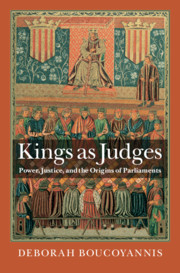Book contents
- Kings as Judges
- Kings as Judges
- Copyright page
- Contents
- Figures
- Tables
- Preface and Acknowledgments
- Part I The Origins of Representative Institutions: Power, Land, and Courts
- Part II The Origins of Representative Practice: Power, Obligation, and Taxation
- 4 Taxation and Representative Practice: Bargaining vs. Compellence
- 5 Variations in Representative Practice: “Absolutist” France and Castile
- 6 No Taxation of Elites, No Representative Institutions
- Part III Trade, Towns, and the Political Economy of Representation
- Part IV Land, Conditionality, and Property Rights
- Part V Why Representation in the West: Petitions, Collective Responsibility, and Supra-Local Organization
- Bibliography
- Index
5 - Variations in Representative Practice: “Absolutist” France and Castile
from Part II - The Origins of Representative Practice: Power, Obligation, and Taxation
Published online by Cambridge University Press: 18 June 2021
- Kings as Judges
- Kings as Judges
- Copyright page
- Contents
- Figures
- Tables
- Preface and Acknowledgments
- Part I The Origins of Representative Institutions: Power, Land, and Courts
- Part II The Origins of Representative Practice: Power, Obligation, and Taxation
- 4 Taxation and Representative Practice: Bargaining vs. Compellence
- 5 Variations in Representative Practice: “Absolutist” France and Castile
- 6 No Taxation of Elites, No Representative Institutions
- Part III Trade, Towns, and the Political Economy of Representation
- Part IV Land, Conditionality, and Property Rights
- Part V Why Representation in the West: Petitions, Collective Responsibility, and Supra-Local Organization
- Bibliography
- Index
Summary
A superior bargaining capacity, especially of urban and commercial groups, is considered to be the foundation of representative institutions. However, in large polities like France and Castile, the pre-eminence of urban groups in representative institutions was causally related to the ultimate decline of those institutions and the devolution of the two regimes into "absolutism." The chapter first shows how the French Estates-General lapsed due to the greater weakness of the French crown; "divide et impera" is the preferred strategy of weak kings. "Absolutism" is the outcome, not the goal. French kings could not secure representatives armed with full powers, as local assemblies retained the right of tax approval. It is not that the demands of representation were weaker in France; urban groups often articulated even more radical claims. Absent the nobility, however, they failed to retain bargaining powers. Similar conditions operated in Castile. However, I show that greater early strength of the Castilian crown allowed some institutional layering and functional fusion to occur, which explains why the Castilian Cortes was more long-lasting and continuous than its French counterpart, a puzzle not hitherto explained.
- Type
- Chapter
- Information
- Kings as JudgesPower, Justice, and the Origins of Parliaments, pp. 105 - 129Publisher: Cambridge University PressPrint publication year: 2021

